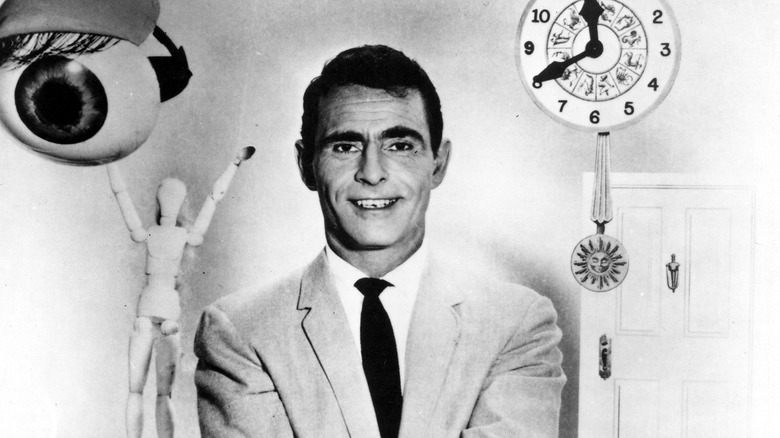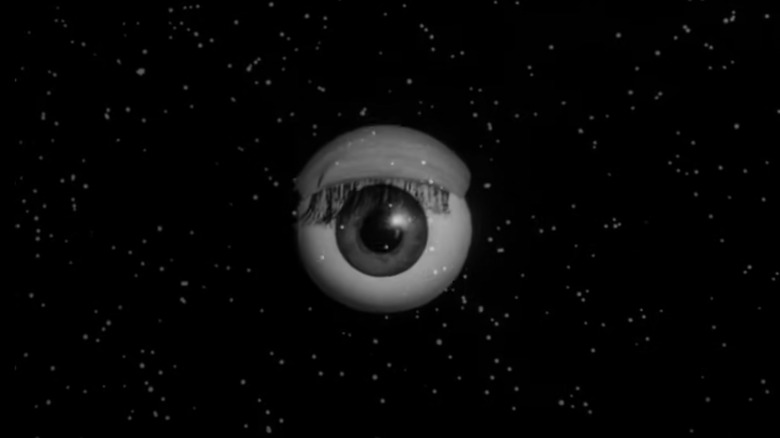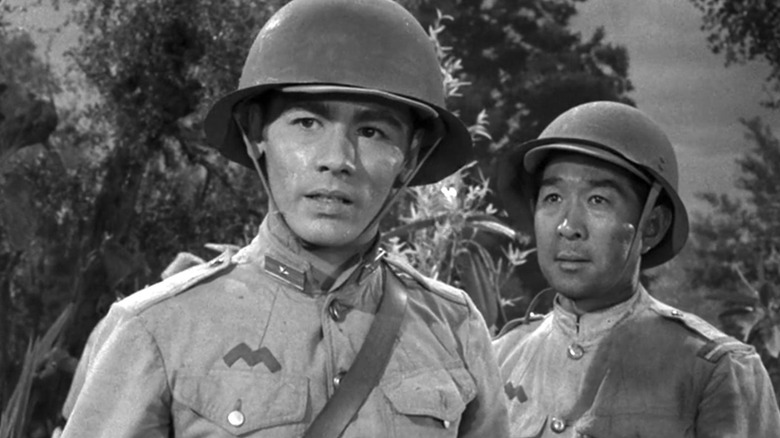How The Twilight Zone Helped Rod Serling Heal His Own Psychological Scars
In the late '40s and early '50s, television focused on the mundane problems of perfect families in idyllic neighborhoods. Popular classics like, "Leave it to Beaver" and "The Adventures of Ozzie and Harriet" reflected happy-go-lucky images of suburbia and domestic life — but that changed when Rod Serling entered the airwaves.
"The Twilight Zone" focused on the strange and unusual, and explored paranormal concepts like time travel, telepathy, and pacts with the devil. The series might seem like an even bigger departure from reality than the idealism of "Leave it to Beaver," but it tackled very real problems.
Before landing his own TV series, an 18-year-old Serling served as a paratrooper in World War II, which was an experience that left him traumatized. In an interview with Press Connects, Anne Serling revealed that her father used "The Twilight Zone" to work out his own personal traumas surrounding war, violence, and bigotry.
The end of an idyllic childhood
As reported by Press Connects, Rod Serling was born in Binghamton, New York, one of the few American cities that escaped the Great Depression because government contracts supplied local companies with enough word to keep people employed. Serling's father owned a grocery store, which was successful enough for the family to live comfortably. Going off of his daughter's descriptions, it sounds like Serling's childhood resembled the blissful images of early television, but he was introduced to the hardships of reality at 18.
Like many young Americans, Serling signed up for the army shortly after Pearl Harbor was bombed. As a Jewish man, he felt compelled to help fight against the Nazis in WWII, but ended up facing off against Japan in the Pacific War instead. His wrist and knee were wounded by bomb shrapnel during the Battle of Leyte in 1944, earning him a Purple Heart and a Bronze Star. However, Serling brought back more than medals from WWII.
Like a lot of veterans, Serling witnessed an overwhelming amount of violence and death, which haunted him long after he left the battlefield. According to Anne, her father was often plagued by the horrors of war in his sleep. "What I vividly recall is my dad having nightmares," she said, "and in the morning I would ask him what happened, and he would say he dreamed the Japanese were coming at him."
Unfortunately, PTSD is all too common among veterans, and 47% of suffers do not receive the help they need. Fortunately for Serling, he was a gifted writer and storyteller, who found a way to work through his trauma by creating stories. According to his daughter, "he got it off his chest in his writing."
Shadow and substance
After his time in the army, Serling spent years pumping out scripts for long forgotten TV shows like "Lux Video Theatre," and "Studio One," which sometimes touched on war and the paranormal, before creating his own show in 1959. "The Twilight Zone" is often remembered for its pioneering exploration of the weird and spooky, but providing an audience with thrills and chills wasn't Serling's main objective when writing it. A critical analysis of "The Twilight Zone" reveals that Serling used the paranormal to discuss broader issues such as prejudice, brutality, and warfare.
In an episode titled, "He's Alive," the ghost of Hitler inspires an American neo-Nazi (Dennis Hopper) to murder, and brags that such evil acts make them immortal. Through this story, Serling is exposing the festering, ever-present bigotry of modern hate groups. In "I Am the Night—Color Me Black," a town is doomed to live in constant darkness after calling for the execution of a potentially innocent man. The episode examines the way one group's hatred and barbarity spreads and affects everyone.
Since Serling's largest trauma was associated with his time in the army, a large chunk of "The Twilight Zone" episodes focus on war. Among the most poignant is "A Quality of Mercy," which depicts a ruthless American GI swapping bodies with an equally brutal Japanese soldier. The time in someone else's shoes makes the serviceman reconsider his own cruelty, which serves as a critique of senseless violence and the pettiness of war.
"The Twilight Zone" is most famous for offering audiences a glimpse into wondrous and wacky, but Serling's main focus wasn't on the unfamiliar. He used the series to work through his own trauma and explore the darker aspects of reality that created it.


